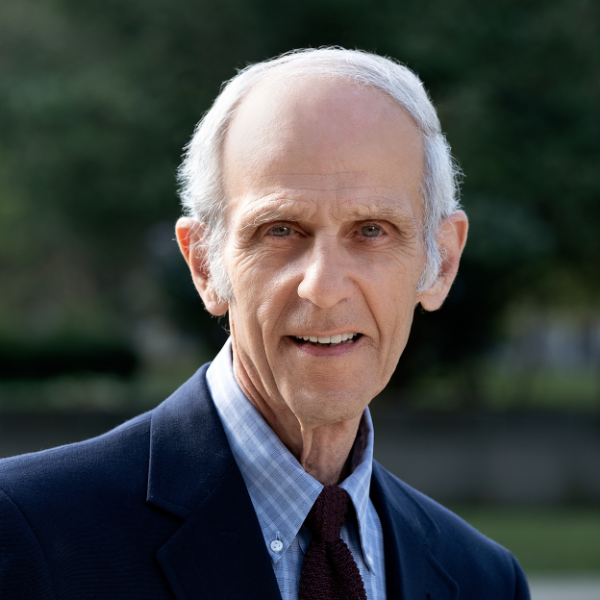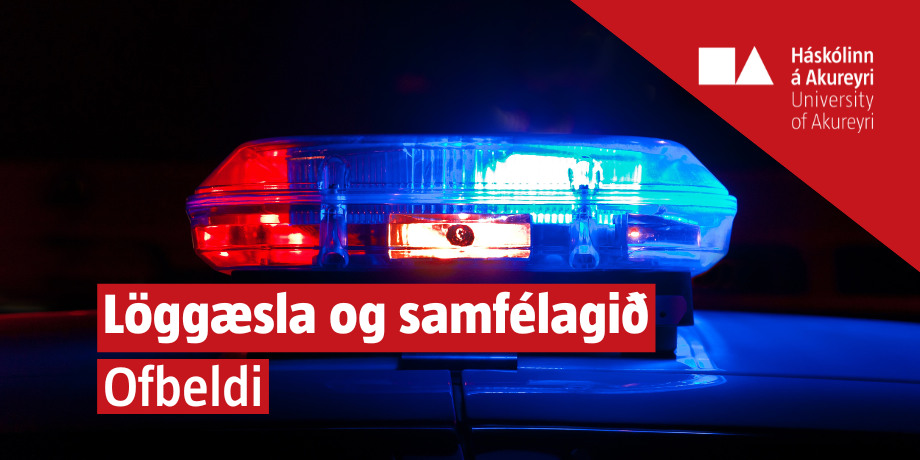- Study
- Student
- Research
- About UNAK
- University
- Schools & faculties
- Governance
- Rector
- Rector’s Office
- University Council
- University Assembly
- University Office
- Laws and regulations
- Organization
- Code of Ethics
- Councils and committees
- Strategies & policies
- On campus
- Human resource
Policing and Society Conference
4.- 5. October
For the 6th time, the Policing and Society Conference takes place at UNAK - The theme of this year's conference is Violence
The Policing and Society Conference is a venue where Icelandic and international academics and professionals meet and converse about policing in a broad sense. This year’s conference theme is Violence.
The Police Science Program at the University of Akureyri (Iceland) invites abstracts for its 6th Policing and Society Conference on October 4 and 5, 2023. The conference is a venue where Icelandic and international academics and professionals meet and converse about policing in a broad sense. Professionals and academics who work in fields that involve policing in one form or another are encouraged to submit abstracts that build on their work and/or research.
The keynote speakers reflect the theme of this year’s conference: Violence – in a broad sense. Violence refers to the use of physical force or power to cause harm. Manifestations of violence are various and are not limited to physical violence. Violence exists everywhere and has serious consequences. Thus, it is always important to identify ways to address and reduce violence.
Program
Wednesday before lunch
9:00-9:10
OPENING: Margrét Valdimarsdóttir, Háskóli Íslands (N101)
9:10-9:50
FIRST KEYNOTE SPEAKER: Trends in youth violence in the Nordic countries: What do we know and should we be worried? Lars Roar Frøyland, Osló Metropolitan háskólinn (N101)
10:00-10:25
- Violent victimization among youth in Iceland: The role of immigrant background – Margrét Valdimarsdóttir (stofa N101)
- „Við erum öll barnavernd“ – þróun tilkynninga til barnaverndar á tímum COVID – Guðný Björk Eydal og Eva Dögg Sigurðardóttir, Háskóli Íslands (stofa M101)
- The Potential to Become a Good Police Officer – Development of a Competency Framework for the Norwegian Police University College – Sarah Abraham, Norski lögregluháskólinn (stofa M102)
- Ofbeldishugtakið – Hrannar Már Hafberg, Háskólinn á Akureyri (M201)
10:25-10:50
- Testing the effectiveness of non uniformed street outreach youth workers, to prevent youth violence by hot spot patrolling: A randomised controlled trial in Leicester England – Simon Rose, Mark Brennan og Chris Maguire, Cambridge háskóli (stofa N101)
- Þróun ofbeldisbrota, höfðu aðgerðir stjórnvalda í tengslum við COVID-19 áhrif á tíðni? – Rannveig Þórisdóttir, Ríkislögreglustjóri og Háskóli Íslands (stofa M101)
- The academization of the Swedish police training program – Hampus Hörberg, Linnaeus háskóli í Växjö (stofa M102)
- Hver gerir hverjum hvað? Kyn, tegundir og birtingarmyndir ofbeldis í nánum samböndum – Freydís Jóna Freysteinsdóttir, Háskóli Íslands og Helga Katrín Hjartardóttir, Barnavernd Ísafjarðarbæjar (stofa M201)
11:00-11:25
- School Resource Officers and Sworn Law Enforcement Officers: Confronting Violence in the North American School Systems – Maria Haberfeld, John Jay College of Criminal Justice, CUNY og Michael D. Alston, The Graduate Center, CUNY (stofa N101)
- Vitundarvakning og ofbeldi á tímum COVID-19, aðgerðir lögreglu og neyðarlínu – Eygló Harðardóttir, Ríkislögreglustjóri (stofa M101)
- Police Education Reform in Iceland: Examining the Legitimating Principles, Contradictions, and Tensions in Policy Discourse – Ólafur Örn Bragason, Ríkislögreglusjóri, Háskólinn á Akureyri og Háskóli Íslands (stofa M102)
- Hvernig getur réttarvörslukerfið bætt stöðu þolenda ofbeldis í nánum samböndum – Júlí Ósk Antonsdóttir, Háskólinn á Akureyri (stofa M201)
11:25-11:50
- Challenging and Demanding Work: A Study into Stress in the Police – Lillis Rabbing, Norski lögregluskólinn, Bjørn Lau, Knut Inge Fostervold, Osló háskóli og Brita Bjørkelo, Norski lögregluháskólinn (stofa N101)
- Ofbeldi og ungmenni – viðbrögð lögreglu – Þóra Jónasdóttir, Elín Agnes Kristínardóttir og Unnar Þór Bjarnason, Lögreglan á höfuðborgarsvæðinu (stofa M101)
- Academic Pioneers in the Swedish Police: Narratives of phantom pain, organizational pollution and social closure – Magnus Persson og Cecilia Jonsson, Linnaeus háskóli í Växjö (stofa M102)
- Manndráp í nánum samböndum 1970-2021 – Guðbjörg S. Bergsdóttir, Ríkislögreglustjóri og Jónas Orri Jónasson, Lögreglan á höfuðborgarsvæðinu (stofa M201)
12:00-12:45
SECOND KEYNOTE SPEAKER: Violence Turned Inward: Suicide among Police – John Violanti, Buffalo háskóli (N101)
40 minute lunch break – Kaffi Borg is opne on the second floor of the university.
Wednesday after lunch
13:25-13:50
- The Police – a profession to care for – Anna Hafsteinsson Österberg, Anna Melin, Daniel Bjärsholm, Arne Rosendahl Hansen, Olof Hansson, Emilia Martinsson, Linneaus háskóli, Jenny Vikman, Alexander Jansson og Sandra Krugly, Malmö háskóli (stofa N101)
- Börn sem brotaþolar og barnvænleg réttargæsla – Hafdís Una Guðnýjardóttir, Umboðsmaður barna (stofa M101)
- Normalization of accident violence – Katerina Nedbalkova, Masaryk háskóli (stofa M102)
- Kynferðisofeldi – Svala Ísfeld Ólafsdóttir, Háskólinn í Reykjavík (stofa M201)
13:50-14:15
- Norwegian police withholding fire, why? – Steinar Vee Henriksen, Norski lögregluháskólinn, Bjørn Barland, Norski lögregluháskólinn og Bjørn Ivar Kruke, Stavanger háskóli (stofa N101)
- Ofbeldisforvarnir meðal barna og ungmenna – Alfa Dröfn Jóhannsdóttir, Samband íslenskra sveitarfélaga (stofa M101)
- ‘We’re here, we’re queer, and we’re not gonna let them pinkwash!’ Queer ambivalence towards uniformed police contingents in Pride parades – Henning Kaiser Klatran, Norski lögregluháskólinn (stofa M102)
- Hversu algengt er að þolendur kynferðisofbeldis segi lögreglu frá? – Rannveig Sigurvinsdóttir, Erla K. Jónsdóttir, Karen Birna Þorvaldsdóttir og Bryndís Björk Ásgeirsdóttir, Háskólinn í Reykjavík (stofa M201)
14:30-14:55
- Myths of non-routinely armed policing – Ross Hendy, Monash háskóli (stofa N101)
- Hvenær þarf lögregla að beita valdi? – Jónas Orri Jónasson, Tara Sif Khan, Lögreglan á höfuðborgarsvæðinu og Rannveig Þórisdóttir, Ríkislögreglustjóri og Háskóli Íslands (stofa M101)
- Hate crimes in Finland – Jenita Rauta og Marko Juutinen, Finnski lögregluháskólinn (stofa M102)
- Sálræn fyrsta hjálp fyrir gerendur kynferðisbrota – Agnes Björk Blöndal, Lögreglan á Norðurlandi eystra (stofa M201)
14:55-15:20
- Citizens’ perceptions of the police using conducted energy weapons: A comparison between Sweden and Norway – Isabelle Stjerna Doohan og Jonas Hansson, Umeå háskóli (stofa N101)
- Hvenær verður maður hættulegur? Mikilvægi upplýsingamiðaðrar nálgunar við mat á ofbeldishegðun einstaklinga – Sædís Jana Jónsdóttir, Lögreglan á höfuðborgarsvæðinu (stofa M101)
- Policing the Miners – Protectors, Oppressors or Tools of Oppression – Callum MacKechnie, Sarah Harris, Princess Marshall og Rachel Rouncefield, De Montfort háskóli (stofa M102)
- Eftirfylgnisamtöl við sakborninga í kynferðisbrotamálum – Ási Þórðarson, Lögreglan á höfuðborgarsvæðinu (stofa M201)
15:35-16:00
- Standing Out or Standing Down: Police Militarization in the Absence of Official Standing Armies – Amanda Lanigan, Uppsala háskóli (stofa N101)
- Eitt prósent vélhjólasamtökin: Hvers vegna vilja ungir karlar ganga í samtök af þessu tagi? – Helgi Gunnlaugsson, Háskóli Íslands (stofa M101)
- Rebuilding Trust and Rebalancing the Power Dynamic - Rachel Rouncefield og Bolatito Akinrolabu, De Montfort háskóli (stofa M102)
- Ofbeldisgáttin á 112.is – Magga Dóra Ragnarsdóttir og Jana María Guðmundsdóttir, Neyðarlínan (stofa M201)
16:30-19:00 Happy Hour á Berjaya Hotel
19:00 Ráðstefnukvöldverður á veitingastaðnum Aurora á Barjaya Hotel
Thursday
9:00-9:25
- Detaining individuals with mental health difficulties in police cells as a last resource place of safety: Iceland – Rannveig Íva Aspardóttir, Cygnet healthcare og Georgina Mathlin, Queen Mary háskólinn í London (stofa N101)
- Rannsóknar ofbeldisbrota lögreglunnar á höfuðborgarsvæðinu: Verkefni, áskoranir og innleiðing gagnreyndra aðferða – Eiríkur Valberg, Lögreglan á höfuðborgarsvæðinu (stofa M101)
- Investigating the Effect of Implicit Bias in Policing – Antje Joel, De Montfort háskóli (stofa M102)
- Andlegt ofbeldi – Páley Borgþórsdóttir, Lögreglan á Norðurlandi eystra (stofa M201)
9:25-9:50
- Male and female prisoners‘ lifetime experiences of violence and the prevalence of post-traumatic stress symptoms – Katja Koskialho, Katariina Keinonen, Raimo Lappalainen, Jyvaskyla háskóli og Mika Rautanen, National National Institute for Health and Welfare (stofa N101)
- Ofbeldi ungmenna: Sekt eða sakleysi fjölmiðlaefnis? – Guðbjörg Hildur Kolbeins, Háskólinn á Akureyri (stofa M101)
- The Nordic Victim Lawyer Construct: Developments and Tensions – Hildur Fjóla Antonsdóttir, Háskólinn á Akureyri og Solveig Laugerud, Osló háskóli (stofa M102)
- Valdaójafnvægi áhættuþáttur kynferðislegrar áreitni: Reynsla íslenskra íþróttakvenna – Anna Soffía Víkingsdóttir og Jón Gunnar Bernburg, Háskóli Íslands (stofa M201)
10:05-10:30
- Investigative police officers’ strategies to facilitate communication among crime victims of domestic violence and the challenges and opportunities of applying these – Josefina Jarl, Jenny-Ann Brodin Danell og Jonas Hansson, Umeå háskóli (stofa N101)
- „Ég lendi í þessu vinnu minnar vegna.“ Upplifun kennara af ofbeldi af hálfu nemenda í starfi – Berglind Jóna Þorláksdóttir, Háskólinn á Akureyri (stofa M101)
- Humour in the face of Cruelty: Insights from (and for) Police Studies – Giorgio Baruchello, Háskólinn á Akureyri (stofa M102)
- Kynferðisleg áreitni innan lögreglunnar fyrir og eftir Metoo – Finnborg S. Steinþórsdóttir og Gyða M. Pétursdóttir, Háskóli Íslands (stofa M201)
10:30-10:55
- Domestic abuse - under-detected and still difficult to handle for first line responders: New insights from EU research – Joachim Kersten, Þýski lögregluháskólinn (stofa N101)
- Ofbeldi gegn börnum á Íslandi: sögulegt yfirlit og staðan í dag – Geir Gunnlaugsson og Jónína Einarsdóttir, Háskóli Íslands (stofa M101)
- Cyber Violence, An Experiential Liturgical Investigation using Digital Forensics and Criminalistics Frameworks – A Clinical Case Study – Larry Leibrock, Ríkisháskóli Idaho og Fulbright sérfræðingur á sviði netöryggismála (stofa M102)
- Valdstjórnarbrot – Páley Borgþórsdóttir, Lögreglan á Norðurlandi eystra (stofa M201)
11:10-11:35
- Trauma-informed approaches in police custody: a qualitative case study – Karen Goodall og Zara Brodie, Edinborgarháskóli (stofa N101)
- Börn send í sveit: húsráðendur, erfið reynsla og ofbeldi – Jónína Einarsdóttir og Geir Gunnlaugsson, Háskóli Íslands (stofa M101)
- Elements of Cybersecurity Training for Law Enforcement: What works and what doesn’t – Cheryl Purdy, Cumberlands háskóli, Louisville háskóli og Fulbright sérfræðingur á sviði netöryggismála (stofa M102)
- Kvenlögreglan 1920 – 1960 – Eyrún Eyþórsdóttir, Háskólinn á Akureyri (stofa M201)
11:35-12:00
- What is the problem represented to be in the Swedish police authority? – Josefina Jarl og Jenny-Ann Brodin Danell, Umeå háskóli (stofa N101)
- Forvirkar rannsóknarheimildir lögreglu: Staða Íslands og norrænn samanburður – Arnhildur Guðrún Eyþórsdóttir, Háskóli Íslands (stofa M101)
- Sex Offenders Public Register of the Republic of Poland: Problems That Require Solutions – Georgii Sibirtsev, Gdańsk háskóli (stofa M102)
- Upplifun albanskra innflytjenda af afskiptum lögreglu – Bryndís Jónsdóttir, Háskóli Íslands (stofa M201)
12:00-12:25
- Policing violence against the environment – the case of salmon farming – Paul Larsson, Norski lögregluháskólinn (stofa N101)
- Ofbeldisákvæði hegningarlaga og dómaframkvæmd – Skil milli ákvæða og kröfur verknaðarlýsinga – Hrannar Már Hafberg, Háskólinn á Akureyri (stofa M101)
- Students‘ Misconceptions in an Introductory Police Psychology Course – Ólafur Örn Bragason, Ríkislögreglustjóri, Háskólinn á Akureyri og Háskóli Íslands (stofa M102)
12:30-12:35
FINAL WORD: Guðmundur Oddsson, Háskólinn á Akureyri (N101)
Keynote speakers
John M. Violanti, PhD
John M. Violanti is an internationally recognized expert on law enforcement suicide. He is presently a full research professor in the Department of Epidemiology and Environmental Health, School of Public Health and Health Professions, University at Buffalo, N.Y. He is a police veteran, serving with the New York State Police for 23 years as a trooper, the State Police bureau of criminal investigation, and later as a coordinator for State Police psychological assistance program (EAP). Dr. Violanti has written and edited twenty books and 150 peer-reviewed articles on police stress and trauma, concentrating on associations with law enforcement suicide. He has presented nationally and internationally on law enforcement suicide to numerous police departments and organizations and continues to conduct several research projects on suicide.

Lars Roar Frøyland, PhD
Lars Roar Frøyland is a youth researcher associated to The Domestic Violence Research Programme at Norwegian Social Research (NOVA), OsloMet – Oslo Metropolitan University, Norway. He mainly does quantitative research on topics such as violence and abuse, crime and deviancy, and substance use. His latest publications cover physical and digital sexual victimization in youth, sexual harassment in sports, and youth physical fighting. Frøyland holds a PhD in psychology from the University of Oslo with a dissertation on trends in youth violence.

Registration for the conference
Useful Information:
- The conference will be held October 4 and 5, 2023, in the Miðborg house of the University of Akureyri, specifically in rooms N101, M101, M102 and M201.
- The conference runs from 9:00 Wednesday October 4 to 13:00 Thursday October 5.
- Each presentation is allotted 25 minutes, which includes Q&A. Abstracts (maximum 250 words) should be submitted via email (goddsson@unak.is) no later than August 15. Abstracts should include a title, short description, methods, main results and/or arguments. Include information about academic position, profession, and the order of the authors (if more than one).
- The conference registration fee is €55 per person and the program, coffee and refreshments are included. University students attend free of charge. Conference attendees pay for their own travel and accommodation.
- There will be a conference dinner Wednesday October 4.
- Several airlines fly to Iceland, including Icelandair
- Icelandair flies from Reykjavík to Akureyri, see informations here. NiceAir flies direct to Akureyri from Copenhagen, Alicante, etc. See informations here.
Further information:
For more information contact Guðmundur Oddsson, Professor of Sociology at the University of Akureyri goddsson@unak.is; tel. +354 460 8677
